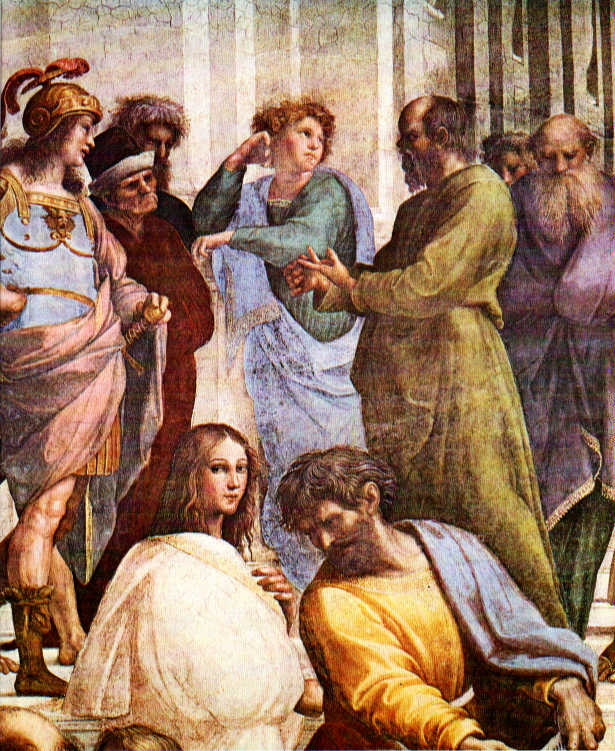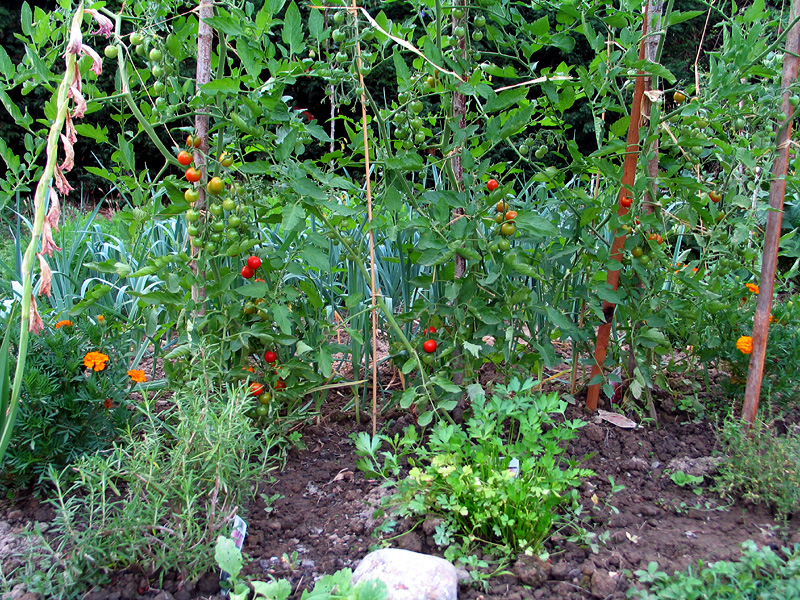
Before tonight's debate, which I probably won't watch (it's really hard on my blood pressure; instead, I read transcripts the next day. I do, however, occasionally watch with the sound off to see what body language looks like), I decided to get something off my chest. So far I've hesitated to blog roughshod into politics because some of my best and most beloved friends and family espouse views that differ significantly from mine. In truth, despite my often apparent "leftiness," I'm a fairly conservative person--in terms of family values, hearth, home, all that stuff. And despite my fairly radical anti-capitalism (at least capitalism as it has emerged since the Industrial Revolution), I have a lot of views that folks might think of as pretty conservative.
One of these concerns the idea of democracy. I think, in essence, that Socrates and Plato were right. Democracy doesn't work unless the populace that practices it is educated; otherwise you get mob rule. A person can't get a whole lot more conservative than siding with an ancient Greek dead white guy.
Today, of course, participation in governance is the birthright of every citizen in this country and in other modern democracies and social democracies. Citizenship entails responsibilities as well as rights--which is as it should be--although many seem to forget the responsibility part in the heat of political campaigns.
At any rate, at the risk of offending all sorts of people, I'm going to go out on a limb here and tell you why I think John McCain and (even more so) Sarah Palin are not good prospects for leaders in a modern democracy--especially one trying to maintain a place of power and prominence in an increasingly global economy.
It has to do with metaphor. Human beings, whom I like to refer to (as a species) as
homo translator (man the translator, or metaphor-maker), rely on metaphorical thinking. As I've noted previously, there are two basic ways human beings learn stuff: by hearsay and by experience (Socrates develops these two varieties of education in
The Republic). We learn when people tell us stories about what they and our ancestors have done, and we learn by doing things ourselves (remember chemistry lab?). Both of these ways of learning provide us with examples from which we can extrapolate ideas and apply them to new situations. Both similarities to and differences from other situations (ones we're more familiar with) help us to understand what's going on.

The value of formal education is that it expands our repertoir of examples by encouraging us to learn many more stories than we get locally (from family and friends, and in our own time). These stories add to our "cultural pool of metaphor" (the term comes from
Gerald Holton) by including information from a much vaster range of people and from a much broader temporal spectrum than we could ever actually experience. We couple those stories with our own "local" learning and experience to gain a more broadly-based, richer education. I won't go as far as Plato and Socrates in saying that popular knowledge doesn't really count; but I will say that book-learning and wider exposure to the world prepare leaders better than does hanging around at the local saloon, drinking a Bud Light. Not that pub-crawling isn't good for philosophy; without the taverns in Edinburgh, the Scottish Enlightenment might never have happened, and Adam Smith might never have written
The Wealth of Nations.
As I was saying, these combined modes of learning form the foundation for the kind of education needed to run a democracy. If some people have vastly diminished learning resources, they can't participate as completely or as well. And this is one of the abiding difficulties facing modern democracy: making sure every citizen has the opportunity to become well educated and to participate in governing his or her country.
The word "populist" has recently exploded into our common vocabulary to describe a particular kind of political candidate. It's gone beyond an earlier description of someone who rises from the working or middle classes and represents the concerns of most citizens. Very recently it has come to refer to someone who's not only not a political insider, but also not an "elitist." Populists of this description don't necessarily have much of an education, but can draw on even fairly restricted experience because they "know what it's like" to be an average Joe, to be like "everyman" (or "everywoman"). They don't have to know about tough subjects like economics, because they'll have people to advise them.
So a few questions begin to emerge: if you don't know much about a subject like economics, how are you going to evaluate the advice you're given? If you have no grounding in international relations and understand little about other cultures, how are you going to know if somebody's selling you a bill of goods when his or her advice is to wage war? If you're not conversant with the fundamentals of capitalism, how are you going to negotiate the nuances of the horrifically complex system that has emerged in the last century, and is now compounded by the reality of globalization? If you don't understand basic environmental science, how can you govern in a time of climatic crisis?
As I listen to Sarah Palin stumble around questions in interviews, it becomes clear that she is just not very well educated. She does seem to have plenty of street smarts, and good local political instincts (because she is just like the people she governs in Alaska). Her pool of metaphor is adequate for people who have a passel of kids, drive snow mobiles, work on pipelines, play hockey, and shoot moose (or wolves). But most of the world shares only one or two of these experiences; it's clear, for example, that aside from child-rearing she shares little enough with me. Palin's metaphors are primarily local and extremely hackneyed. She lacks the historical and cultural background that true world leaders need simply to hold a conversation with one another for longer than a brief introduction at the UN. Her entire candidacy is based on strongly held, inflexible religious and political views, and severely limited experience of the world.
John McCain, on the other hand, has both education and experience on his side. Being a graduate of Annapolis ensures a young Naval officer of a solid academic background, albeit one focused on what makes a good military man (and although he graduated near the bottom of his class). A significant chunk of his experience, however, comes from his incarceration in Vietnam, and very few of the rest of us share anything like it. We have no way of knowing how it colored his understanding of the world. His time in prison also looms so large in his life that it seems to have become the central defining metaphor for every other experience. And when I listen to him debate and participate in interviews, seldom do I
not hear a reference, either open or oblique, to what he endured and what it taught him. As horrific and impossible for the rest of us to truly understand as it was, it happened half a lifetime ago. His experiences since that time, however, take a back seat to that single, all-consuming narrative.
Because of his less-then-stellar academic record, McCain's educational credentials don't make him susceptible to complaints about elitism. He doesn't have to apologize for an Ivy League education or for a reputation as a thinker. In that, he and Palin share a populist pulpit from which they can make fun of deliberation and intellectualism, and brag about making decisions with their guts or without blinking. And this is precisely where I have a problem.
The careful thinking-through of problems that comes with broad experience is a quality I would like to see in someone who works next to a red telephone and has a button within reach. I do not want somebody who reacts with his or her guts rather than his or her brains. And I want as leaders people who have enough cultural experience to include books like John Hersey's
Hiroshima, Herman Wouk's
The Winds of War, and films like
Seven Days In May and
Dr. Strangelove in their library of metaphors.
When we begin to denigrate our public intellectuals and to decry intellectualism as elitism, we are also sending a message that does every child in this country a disservice. When we make fun of smart people, but make our kids suffer the indignities of today's public schools--and then tell them that they have to go to college--we're sending them a very mixed message.
Unless we start electing people with the intellectual substance to solve our economic problems and rebuild our reputation among other world leaders and their constituencies, and until we have a president who's smart enough to evaluate evidence carefully and honestly, we'll continue on the path laid down over the last eight years. And without fresh, complex, vibrant metaphors and examples on which to model an alternative future, there's little hope that things will get better any time soon.
On a conciliatory note, if anyone's still with me after this rant, I'll end with a apt quotation from
Editorial Anonymous (a blog on publishing children's books), which sums up my view of party politics:
. . . I don't mind what party people align themselves with. The nice thing about book people is that they're thinking people, and as long as you're thinking, you get to vote however you want. The people who drive me crazy are the ones who vote "from their gut". . . . Thinking people like to talk civilly and intelligently about issues, and as long as you're ready to do that, you're in the club. A post-debate update, 3 October: I did watch it. And I haven't changed my mind. The main difficulty as I see it is that Palin didn't answer the questions posed; she gave speeches. She also winked and looked cute and tried hard to be folksy. She even asked if she could call Senator Biden "Joe" (he referred to her throughout as "Governor Palin" or "the governor"), so although the exchange was civil and even friendly, it lacked decorum. I'm glad she didn't embarrass herself, and it's clear that she's a quick study. But I'm still convinced that her time has not yet come.
Image credits: Manuscript of Sughrat (Socrates) from a 13th century Seljuk illustrator. Currently kept at Topkapi Palace Library, Istanbul, Turkey; Socrates lecturing, from Raphael's School of Athens, Stanza dei Conservatori, Vatican. Both from Wikimedia Commons.
 Back when I used to live in East Dallas, I'd often drive by Stonewall Jackson Elementary school on Mockingbird Lane. It's a fairly nondescript little school, but it sports a terrific garden that's visible from the street. I'd often see folks from the community, as well as the children, puttering around, and I was always amazed at how lovely, inviting, and verdant it looked.
Back when I used to live in East Dallas, I'd often drive by Stonewall Jackson Elementary school on Mockingbird Lane. It's a fairly nondescript little school, but it sports a terrific garden that's visible from the street. I'd often see folks from the community, as well as the children, puttering around, and I was always amazed at how lovely, inviting, and verdant it looked.














